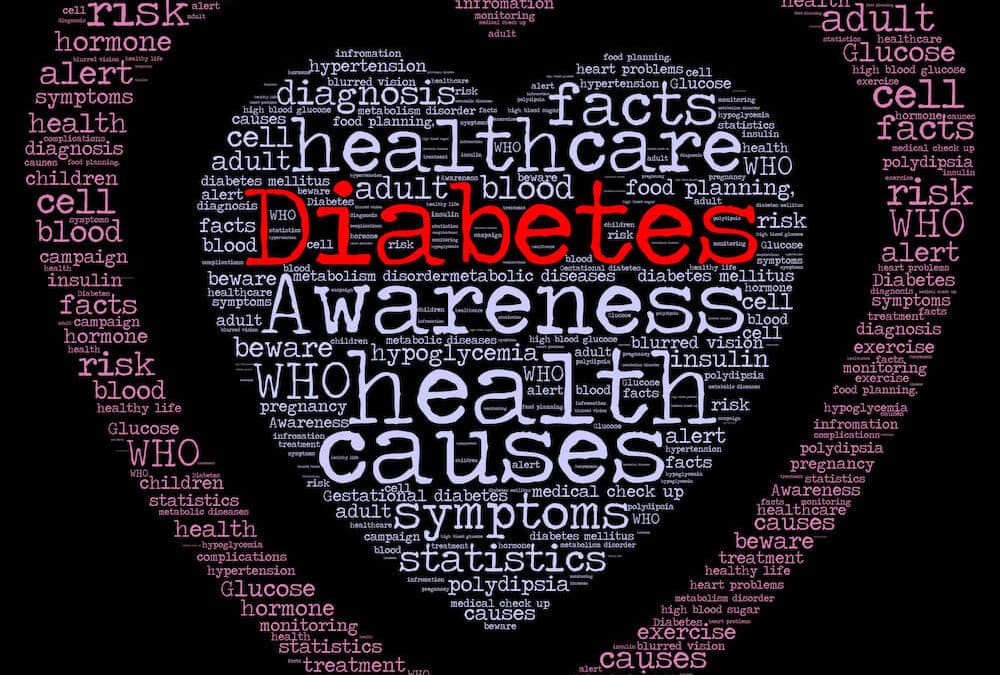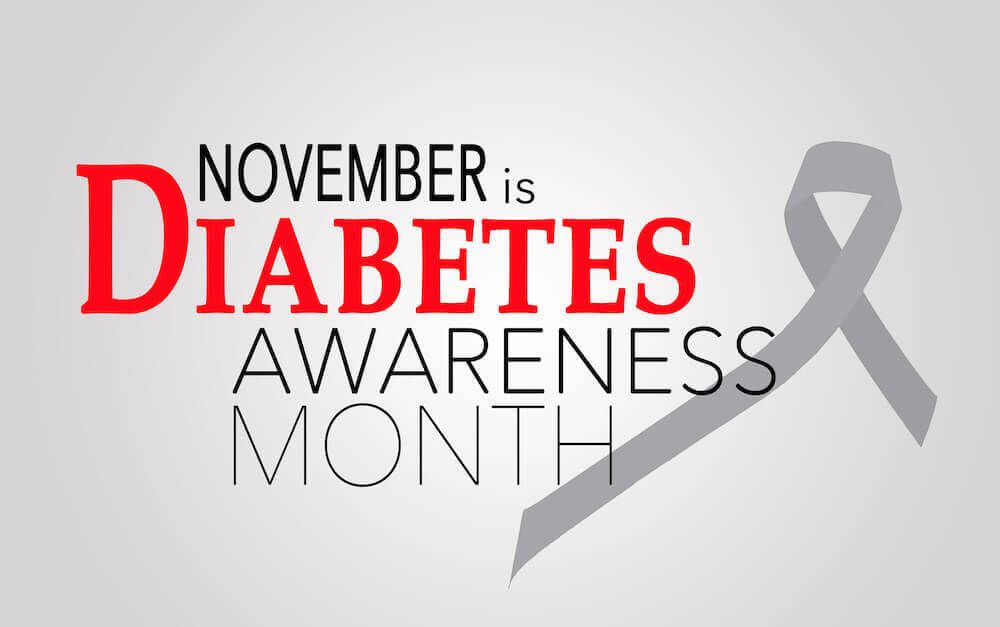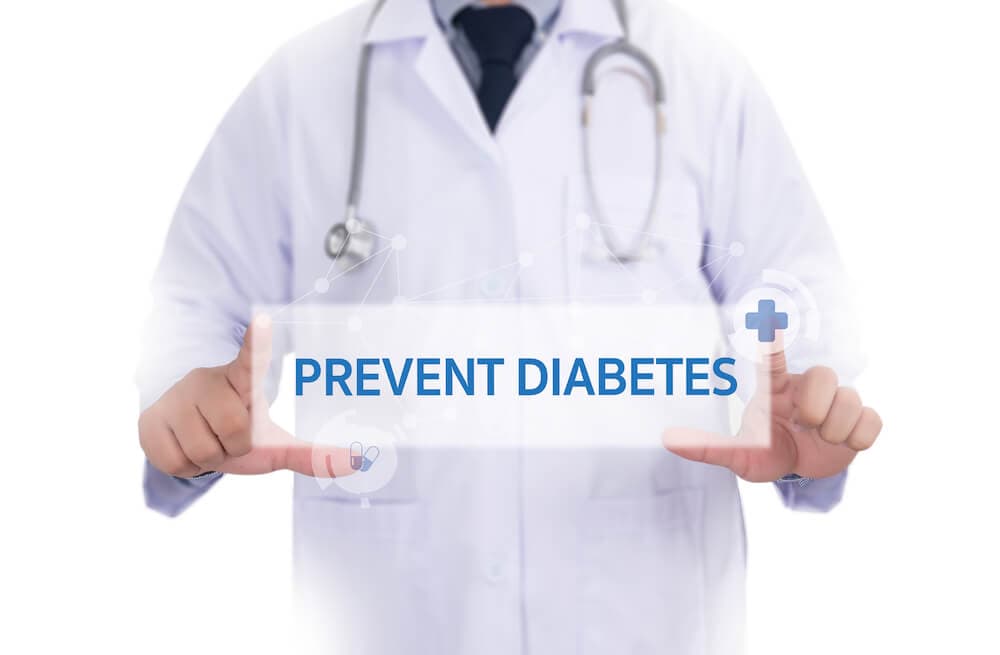
Diabetes is one of the most common diseases in the United States and can lead to serious eye health complications, and even blindness, if not controlled. Over 29 million people in the U.S. have diabetes and 1 out of every 4 don’t even know they have it. However, if you are one of the individuals who have been diagnosed with diabetes, there are ways to manage it and reduce your risk of developing further health complications.

How does diabetes affect my vision?
Diabetes affects your eyes when your blood glucose (or blood sugar) is too high. In the early stages, you are not likely to experience vision loss from high blood glucose, although some people may experience blurriness during medication changes. High blood glucose can change the fluid levels or cause swelling in eye tissue which leads to blurred vision. Fortunately, in the short term, this blurred vision is temporary and goes away when your glucose levels return to normal.
If your blood glucose levels remain high for a prolonged period of time, it can cause damage to the blood vessels in your eyes and lead to swelling, scarring, or dangerously high pressure in your eyes. The damaged blood vessels are the leading cause of the diabetic eye diseases.
Diabetic Retinopathy
Diabetic retinopathy is the leading cause of new cases of blindness among working-age people in the United States. In diabetic retinopathy, leakage and hemorrhage occur in the retina (the back of the eye) leading to the loss of vision.
Diabetic Macular Edema
Diabetic macular edema is a condition where swelling occurs in the 20/20 spot of the retina or the macula. Given that this is the part of your retina that aids in vision for reading, driving, and seeing faces, this condition can lead to partial vision loss or blindness if left untreated. Often times, macular edema develops in people who already have diabetic retinopathy. Laser treatment at the appropriate time can prevent bleeding within the eye and vision loss from macular edema.
Glaucoma
Glaucoma is a disease of the optic nerve — the part of the eye that carries the images we see to the brain. The optic nerve is made up of many nerve fibers, like an electric cable containing numerous wires. When damage to the optic nerve fibers occurs, blind spots develop. These blind spots usually go undetected until the optic nerve is significantly damaged. Diabetes doubles the likelihood of having glaucoma, and if left untreated can damage the nerve significantly enough and lead to blindness.
Cataracts
A cataract is a clouding of the eye’s natural lens resulting in blurred or dimmed vision often causing a loss of contrast or change in color vision. People often describe the effects of cataracts as looking through wax paper or cloudy cellophane. Nearly everyone eventually develops cataracts as they age. However, people with diabetes are at a higher risk of developing cataracts at an earlier age than someone without diabetes.
How do doctors treat Diabetic Eye Disease?
If you have diabetes, your doctor may recommend more than one eye exam annually, in addition to a management plan. If you’re experiencing advanced eye health complications, your doctor may treat these conditions with medicine, laser treatments, surgery, or a combination of all 3 treatment options.
Diagnosis
Rapidly fluctuating or changing eyeglasses prescriptions is sometimes the first sign that a patient has diabetes. It’s caused by changes in the lens of the patient’s eye, and they will see a big improvement/stabilization of glasses prescription as the blood sugar levels stabilize.
Horribly blurred vision or an inability to recognize faces or read (even with glasses) can be a sign of more serious problems (ie.: diabetic retinopathy). Laser, anti-VEGF injections, or surgery may be needed.
Medicine
Anti-VEGF medicines, such as Avastin, Lucentis, and Eyelea can be used to treat diabetic retinopathy and macular edema. Anti-VEGF works by slowing down the growth of blood vessels in the eye. This process then slows or stops the damage from the abnormal blood vessels and slows down vision loss. Sometimes it’s been proven to even improve vision.
Topical (eye drop) medications are effective in lowering intraocular pressure associated with glaucoma. The end goal with glaucoma treatment is to lower eye pressure, and a variety of medications can help aid in this process by decreasing fluid production or increasing the outflow of fluid in your eye.
Cataract Surgery
Diabetics are more likely to develop cataracts at an early age. In fact, 10 to 20% of all of the cataract surgeries that we do are performed on patients with diabetes. During cataract surgery, the doctor removes the cloudy lens in your eye that’s disrupting your vision and replaces it with an artificial lens implant. Fortunately for patients, this is a fairly quick and painless outpatient procedure. Davidorf Eye Group specializes in cataract surgery, offering small incision cataract surgery and Monofocal, Toric, Multifocal, and Accommodative Lenses. Patients with well-controlled diabetes without significant retina problems can oftentimes still be candidates for the special lenses and surgical techniques designed to allow patients to see without glasses (Refractive Cataract Surgery).
Selective Laser Trabeculoplasty
A procedure called Selective Laser Trabeculoplasty (SLT) is also effective at lowering intraocular pressure associated with glaucoma. The SLT procedure is essentially painless, takes two to three minutes to perform, and requires no post-procedural restrictions. Sometimes, neither the SLT procedure or eye drops alone can provide adequate pressure control. These treatments can be used in combination, but, at times, conventional surgery in the operating room may be necessary for Glaucoma. Similar to non-diabetics, patients with diabetes are usually still candidates for SLT as a means to control their eye pressure.
Minimally Invasive Glaucoma Surgery (MIGS)
Glaucoma surgery has historically involved procedures that are often associated with a protracted recovery period. Fortunately, over the last several years, new procedures have become available that allow patients the opportunity for improved eye pressure control but without the recovery challenges and risks of prior techniques.
Diabetes and LASIK
A common question the diabetics have is whether or not they qualify as candidates for having laser vision correction. The answer is pretty much the same as it was for refractive cataract surgery discussed above. If patients have no serious diabetic eye disease like diabetic retinopathy and have no history of healing difficulties (from accidental or surgical cuts), they will likely qualify as candidates. Of course, the patient’s prescription should be relatively stable as is the case with our non-diabetic LASIK seeking patients.

How can I protect my vision from Diabetic Eye Disease?
The best step to take in keeping your eyes healthy is through preventative care. You can manage your diabetes and protect your vision by:
- Managing your blood glucose, blood pressure, and cholesterol through a combination of healthy dietary choices, exercise, and taking medications as prescribed.
- If you’re a smoker, find a way to get help in kicking the habit once and for all.
- Have a dilated eye exam.
One of the best ways to manage your diabetes is by seeing your eye doctor annually for comprehensive eye exams. During a dilated eye exam, your eye doctor will examine your eyes for signs of diabetic retinopathy or other diabetic eye diseases such as diabetic macular edema, glaucoma, or cataracts.
Diabetic eye diseases are usually symptom-free in the early stages, which is why regular eye exams are so important. By dilating your eyes you doctor will be able to closely examine your retina and optic nerve for signs of damage. That way, if they do find signs of disease you can begin treatment early.
If you are living with diabetes and it’s been over a year since your last eye exam, don’t wait! Schedule an appointment with one of our doctors today.
Sources:
https://www.aao.org/eye-health/drugs/anti-vegf-treatments
https://www.glaucoma.org/gleams/glaucoma-medications-and-their-side-effects.php



